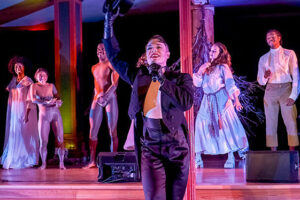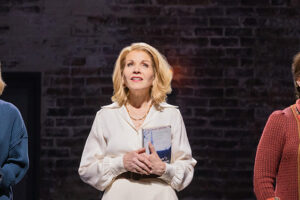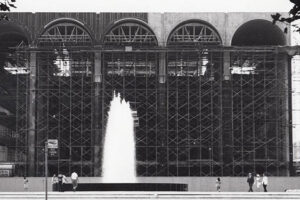

Kitsch is alive and well in Rossini’s La Cenerentola at the War Memorial, and in saying so, I’m only being 90% as rotten as you think, because I do mean “alive” in a sense, and maybe even well. Rossini, you know, is all about finding the sublime through the formulaic, but it’s a tricky endeavor as the sublime is something of a moving target.
Jean-Pierre Ponnelle’s production announces its battle plan as soon as the curtain rises. The set is sketched and scumbled in the manner of a cartoon, and the comings and going in front of it, lovingly resuscitated from a 1969 production, are consistent with that aesthetic. Ponnelle was apparently known for finding something modern and sometimes dark or subversive in works ossified in tradition, but as faithful as this production was, according to those involved, time does march on, and what may have looked cheekily satirical now has the humor of a sitcom you love mostly because you loved it when it was still funny.

Karine Deshayes has an understated take, which in another production, might have crossed the footlights better. Surrounded by kitsch, she had a tendency to disappear despite her immaculate coloratura and delicious timbre. Orchestral balance was also, it must be said, at times a bit of a challenge under Jesus Lopez-Cobos’ otherwise sympathetically wielded baton. The conductor is making his return to the company of his operatic debut after a long absence, and while he occasionally covered his singers, his ebullient feel for a Rossini crescendo was appreciated.
The singer least taxed by those balance issues was our Don Magnifico, Carlos Chausson, who threatened to walk off with the show. It’s always a good instinct in this kind of fare to avoid the obvious in whatever way you can. Chausson eschewed the “gosh, I’m out of breath!” schtick many default to in Rossini’s wordiest patters, instead singing his with an insouciant authority that made them all the funnier. “Trust in the material” might have been a good philosophy for the production on a whole, judging by his example. It doesn’t hurt that the voice is also firm and handsome.

Christian Van Horn continues his winning streak, making secondary roles seem downright central while he’s onstage. His Alidoro was fluid and warm of tone. Clorinda and Tisbe were sung by Adler fellows Maria Valdes and Zanda Svede, who sang prettily through the shitstorm of kitsch those characters, in particular, generate. No matter how gentle their roulades, I could only daydream wistfully of some humorless revision, littered with corpses.
It is odd to find, especially considering the tonal gumming we were given, that Cenerentola was not chosen for an English-language, chopped-to-an-hour family presentation this season, and odder still that Boheme was. And to the five-year-old girl who was seated beside me and restless from the get-go, all I can say is: I know, honey. Frozen was a lot more fun.
Photos © Cory Weaver/San Francisco Opera.























Comments